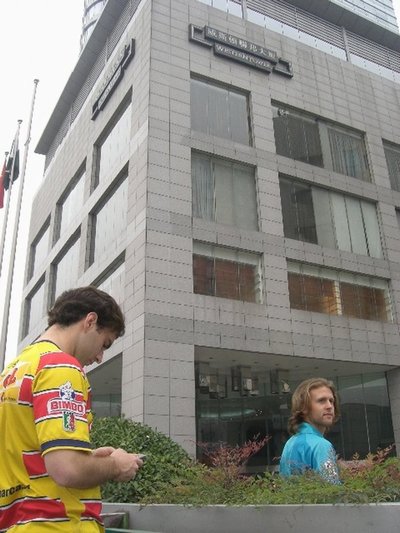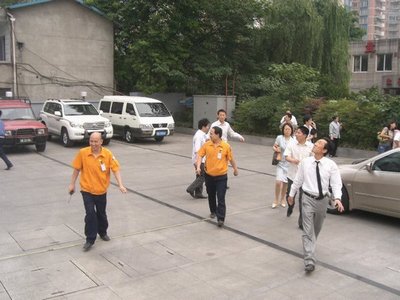May 15, 2008
UW students unharmed in China earthquake but administration considered evacuation
| NEWS ALERT: The Chinese Student Association and the Chinese Students and Scholars Association will hold a candlelight vigil on Tuesday, May 20, at 8:30 p.m. in Red Square on the UW Seattle campus. The Vigil for Victims will raise money for earthquake relief. |
When the magnitude 7.9 earthquake struck Sichuan province in south central China on Monday, 10 University of Washington exchange students and the site manager in charge of them were in the provincial capital of Chengdu, only 40 miles southeast of the epicenter.
Since then, five students have left Chengdu for a temporary stay in Shanghai. The other five, as well as the site manager, have decided to remain. Nobody in the 11-member group has been injured in the earthquake or its aftermath, and the members in Chengdu are dividing their time between studies at Sichuan University, and helping with relief efforts in the city.
Earlier in the week, however, UW administrators seriously discussed whether to bring everybody home.
Steve Harrell, a UW anthropology professor who also directs UW Worldwide Sichuan Exchange, went online at 5:30 a.m. Monday, learning in an e-mail from site manager Eddie Schmitt that nine of 10 UW students had been located safe and unharmed. Within half an hour, Schmitt located the 1ast one, also unharmed.
Early reports indicated it was probably safe for Schmitt and the students to remain in Chengdu, Harrell said.
“We learned about a small amount of structural damage to buildings, but nothing serious, and most human injuries were from panicking, from jumping off roofs and the like,” Harrell said.
Students Geoffrey Morgan and Steven Margitan said tent cities popped up all over Chengdu, including a large one in a sports stadium, the result of citizen uncertainty about stability of buildings. Food and water, however, were readily available.
Still, in Seattle, there were worries. Tuesday morning, UW Provost Phyllis Wise assembled a team to consider an evacuation plan. Members of the team included Harrell; Hank Wang, who directs the UW office in Beijing; Ana Mari Cauce, dean of Arts & Sciences; Rebecca Bullock, director of risk financing and risk management; and Cameron Frisch, interim director of International Programs & Exchanges.
They talked with advisers at the U.S. consulate general in Chengdu, advisers at the U.S. State Department and several private citizens, some American, some Chinese, in Chengdu.
By late Tuesday evening, the team decided to make arrangements for students who wished to leave Chengdu, and require those remaining to sign a risk acknowledgement form. They also made sure departing students would receive full credit for the term at Sichuan University, which ends July 15, and secured reservations at a moderately priced hotel in Shanghai.
As it turned out, some departing students had already bought plane tickets and arranged to stay with friends in Shanghai.
“These students aren’t helpless,” Harrell said. “They don’t need to be led around by the hand. They speak Chinese, and are considerably able to operate on their own. If we had perceived serious risk,” he added, “we’d have gotten all students out.”
UW Worldwide Sichuan Exchange began in 2002. Ten to 15 UW students spend an academic year at Sichuan University, and the same number of Chinese students attend the UW. In China, the UW students take intensive classes in Chinese along with courses in such things as Chinese history, culture and urban ecology. They also undertake an individual or group research project, often in environmental matters, Harrell said.


